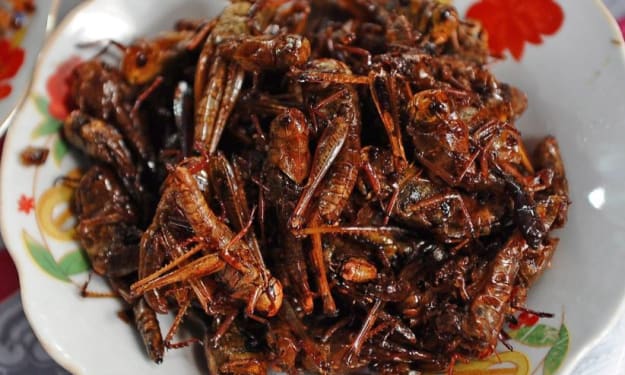
Entering the car after a short trip into the grocery store, you stare at the quick decision made at the checkout line. You unwrap the luxurious gold foil enclosing a creamy milk chocolate ball covered with finely chopped hazelnuts. You bite into the center, exposing a perfectly roasted hazelnut, surrounded by a luscious, smooth filling, and delicate crisp wafer. Envisioning childhood memories, you close your eyes as the melting chocolate consumes your tongue.
Many factors influence the consumption of junk food. Whether from a mental, emotional, physical, and/or spiritual connection, the love of junk food has made its way into our daily rituals. From driving to work to midnight snacks, most Americans indulge in the satisfying pleasures of fast foods. “Food is available almost everywhere and affordable to most people” (Hellmich). The junk food epidemic in our nation makes you wonder, why is junk food so popular in America? And what effects arise from eating junk food? Although the reasons may vary, the results of junk food consumption are evidently the same.
To grasp a better understanding about the hunger for junk food, we should know what it actually is. Junk food is food that is high in calories but low in nutritional content. “It’s the stuff you eat that has little to no nutritional value, usually combined with ingredients that are bad for you, or is high in calories when consumed in excess. So that means candy, chips, cookies, cake, sugary soft drinks, greasy burgers, hot dogs, French fries, ice cream, and most things that are served at fast food restaurants qualify as junk foods” (Lehman). So why is junk food so popular in America? There are three possible reasons for a junk food overload: taste, availability, and affordability.
We can all agree that junk food is tasty. An excessive amount of money and strategy goes into designing junk food. It is the U.S. food industry’s goal to keep us craving more. “Food companies compete fiercely for consumer dollars, spending $30 billion annually on marketing and advertising campaigns trying to convince people to eat more of their products and to eat their product over another product. “ They want people to eat when they're not hungry and keep eating when they're full, one way they do that: Large portions” (Nestle). Food industries alter and add more unnecessary ingredients, as well as, increase the portion sizes. When Coca-Cola first appeared on the market, they mixed cocaine in their drinks, and dark fizzy drinks contain phosphoric acid, which gives that taste we crave for and makes us buy them again. Pizza Hut, Dominos, KFC, Burger King, McDonald’s all have certain secret ingredients and large portions (large, extra-large, and extra extra-large) which makes us crave and eat more. These are examples of what food industries will do to increase profit. Junk food stimulates our senses so we crave more of it, making junk food popular amongst consumers.
Despite the fact that junk food lacks nutritional necessities, food industries want to make it available and affordable for the consumers. Junk food is everywhere! You can find them in vending machines, convenience stores, and even stores that do not typically sell food items might have snacks and sodas near the cashiers. Most Americans tend to have busy lives, between a nine to five job, family life, and all the traveling in between influences junk food popularity. We, as living beings, have to eat, but our busy schedules do not permit enough time to prepare meals, so we settle for what is easy. “Whole foods such as vegetables and meat take time and kitchen equipment to cook properly, while fast-food hamburgers are usually served within minutes of ordering. Over time, that convenience becomes a habit and eventually a perceived necessity to keep up with such a fast-paced society” (Varshini). In addition, junk food is affordable. The cheap food revolution has aided the fast food revolution. “American corn production has tripled in the past 40 years, from four billion bu. in 1970 to 12 billion. Billions of dollars of subsidies have injected steroids into corn production, and our farmers have injected chemicals into our fields— "American farmers now produce an astounding 153 bu. of corn per acre, up from 118 as recently as 1990. Money might be scarce, but cheap food is abundant” (Thompson). Lowered food expenses persuade consumer decisions to buy more junk food. Thus, excess availability of calorie-dense snack foods at affordable prices cause it to be a high demand for most Americans.
Junk food tastes great and is cheap and accessible, making it a popular trend in America. Consequently, changing the taste and size of food, increasing the availability of fast food, and cramming as many calories into a dollar and a minute as possible making junk food inexpensive, has resulted in health risks and economic consequences. With statistical associations to weight gain and/or obesity, diabetes, and cardiovascular conditions, eating fast food can be a danger to your health. “For example, a weight gain of 11 to 18 pounds increases a person's risk of developing type 2 diabetes to twice that of individuals who have not gained weight, while those who gain 44 pounds or more have four times the risk of type 2 diabetes.” (NCBI). They reported in the Bulletin of the World Health Organization, “While the average number of annual fast food transactions per capita increased from 26.61 to 32.76, average BMI increased from 25.8 to 26.4.” Overweight, obesity, and their associated health problems have substantial economic consequences for the U.S. health care system. Both direct and indirect costs are associated with the increased popularity of junk food. “Direct health care costs refer to preventive, diagnostic, and treatment services related to overweight and obesity (for example, physician visits and hospital and nursing home care). Indirect costs refer to the value of wages lost by people unable to work because of illness or disability, as well as the value of future earnings lost by premature death” (NCBI). Eating an excessive amount of fast food can cause you to gain weight, and weighing too much contributes to heart disease, diabetes, arthritis and other ailments, which then create economic costs. The U.S. Surgeon General David Satcher recently issued a call to action to put the brakes on the epidemic of overweight and obesity in this country.
“We spend excessive amount of money to advertise and change food quality and not enough towards the problems existing in America. Instead of investing in a cause that creates more problems for our country, we should focus on and help the existing ones. Diabetics, heart patients, and overweight and obese Americans that suffer from junk food addictions need our attention. Do not let the profit from a junk food overload destroy the country we have built.
Works Cited
NCBI. The Surgeon General’s call to action to prevent and decrease overweight and obesity. U.S. Department of Health and Human Services. [Rockville, MD]: U.S. Department of Health and Human Services, Public Health Service, Office of the Surgeon General; [2001]. Available from: U.S. GPO, Washington. www.ncbi.nlm.nih.gov/books/NBK44210/#A16. Accessed 13 February 2018.
Schmidhuber, Josef. “The Growing Global Obesity problem: Some Policy Options to address it.” Long-term changes in food consumption patterns. April 22, 2005. www.fao.org/WAICENT/FAOINFO/ECONOMIC/ESD/JSobesity.pdf. Accessed 13 February 2018.
Hellmich, Nanci. “Food for Thought for a Fat Nation.” USATODAY, 2008. February 19, 2002. www.usatoday30.usatoday.com/life/2002/2002-02-19-diet.htm. Accessed 13 February 2018.
Merriam-Webster Incorporated, 2018.www.merriam-webster.com/dictionary/junk%20food. Accessed 14 February 2018.
Fox, Maggie. “Study Shows Exactly How Fast Food Packs on Pounds.” Better. NBC UNIVERSAL, 2018. February 02, 2014. www.nbcnews.com/better/diet-fitness/study-shows-exactly-how-fast-food-packs-pounds-n20351. Accessed 16 February 2018.
Varshini, Satya Madhu. “Why so many people eat junk food.” Quora Inc. 2018. February 17, 2017. www.quora.com/Why-so-many-people-eat-junk-food. Accessed 16 February 2018.
Clear, James. “Why Your Brain Craves Junk Food (and What You Can Do About It).” Lifehacker. Gizmodo Media Group, 2018. November 21, 2013. www.lifehacker.com/why-your-brain-craves-junk-food-and-what-you-can-do-ab-1469120841. Accessed 16 February 2018.
Lehman, Shereen. “What Makes Junk Food a Popular Choice?” Verywellfit. March 27, 2017. www.verywellfit.com/why-you-eat-junk-food-2507661. Accessed 16 February 2018.
Thompson, Derek. “Why is American Food So Cheap?” TheAtlantic, 2018. The Atlantic Monthly Group. January 11, 2010. www.theatlantic.com/business/archive/2010/01/why-is-american-food-so-cheap/33259/. Accessed 16 February 2018.
Lee, Matthew. “Statistics of Health Risks From Eating Fast Food.” Healthy Eating. SFGate. Hearst Newspapers. Hearst Communications, Inc. 2018. www.healthyeating.sfgate.com/statistics-health-risks-eating-fast-food-3290.html. Accessed 16 February 2018.
Nestle, Marion. “Food Politics: How the Food Industry Influences Nutrition and Health.” Food Politics. University of California Press 2003.
About the Creator
T. E. Door
I am a writer who is driven by my passion to unravel all understanding of each individual’s narrative I encounter, especially those involving children’s education. I express my love for writing, through poetry, essays, and short stories.






Comments
There are no comments for this story
Be the first to respond and start the conversation.